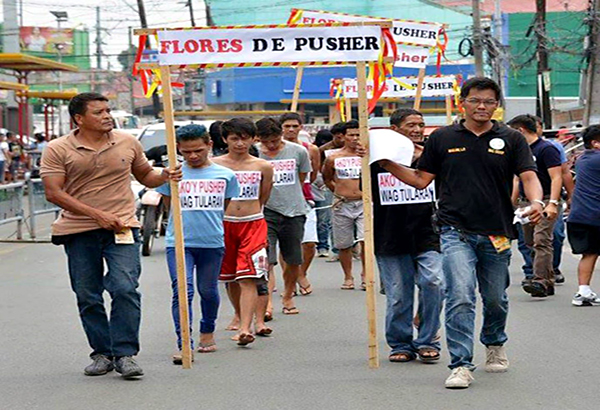By Mortz C. Ortigoza
Around 3 Pm today Harold and I, my radio tandem, dropped by
at the San Carlos City's Police Station.
When I entered the edifice, I wondered why rookie police men
were milling near a detention cell.
“Ano meron diyan,” I came to them and
extended my neck to see what was inside the slammer.
“Iyong matanda sir,
kahuhuli lang namin. Nireklamong nang rape,” a Police Officer -1, with an
equivalent rank of a private in the military, told me.

“Bakit rape, anong
ginawa niya?” I posed.
“Kinarapas niya sa ba-o ang dalaga (she touched the vagina
of a young woman),” one of the rookie policemen butted in in the Pangasinan’s
dialect.
“Karapas (touching)?
Bakit rape, dapat Acts of Lasciviousness ang kinaso niyo,” I told them.
I told the old man that he better prepare twelve thousand pesos
for bail.
“Tell mo iyong PAO
(Public Attorney’s Office) mag reduce bail ka ng P6,000 para makalabas ka ng
kulungan”.
“Saan mo hinawakan ang
babae? I asked him.
“Diyad ba-o sir (at her
vagina, sir),” he told me in the vernacular.
“Tang-ina mo, pag ba-o
iyong hinawakan mo, di na Acts of Lasciviousness iyan, Death Penalty na iyan!,”
I joked that caused guffaw (halakhak) among the beat policemen.
While I was sitting on a chair waiting for the chief of
police, a colonel, a pretty lady captain passed by.
I called her and we exchanged pleasantries. Then I told her: “Turu-an niyo iyong mga batang police ninyo
ng tamang batas. Iyong karapas (touching) kakasuhan daw nila ng Rape, e Acts of
Lasciviousness iyon!”
The gorgeous peace officer retorted: “No sir, it’s rape!
“What? How come it
became rape?” I posed wondering.
“Hindi lang naman niya
hinipu-an. Natutulog iyong dalaga. Nilapitan ng matanda. Dinila-an niya ang ari
ng dalaga (He did not molest the lady. She was sleeping when the culprit
surreptitiously crawled to her and pulled down her underwear and licked her genital”.
“Nakalagay sa Rape Law sir na “any instrument or object, into the genital or anal orifice of another
person, “she cited to me Article 266 of the Revised Penal Code on Rape.
“That’s I agree!” I exclaimed.
Here’s the law:
Republic Act No. 8353
September 30, 1997
AN ACT EXPANDING
THE DEFINITION OF THE CRIME OF RAPE, RECLASSIFYING THE SAME AS A CRIME AGAINST
PERSONS, AMENDING FOR THE PURPOSE ACT NO. 3815, AS AMENDED, OTHERWISE KNOWN AS
THE REVISED PENAL CODE, AND FOR OTHER PURPOSES
Be it enacted by the Senate and House of Representatives
of the Philippines in Congress assembled::
Section 1. Short Title. - This Act
shall be known as "The Anti-Rape Law of 1997."
Section 2. Rape as a Crime Against Persons. -
The crime of rape shall hereafter be classified as a Crime Against Persons
under Title Eight of Act No. 3815, as amended, otherwise known as the Revised
Penal Code. Accordingly, there shall be incorporated into Title Eight of the
same Code a new chapter to be known as Chapter Three on Rape, to read as
follows:
"Chapter Three
"Rape
"Rape
"Article 266-A. Rape: When And How Committed. -
Rape is committed:
"1) By a man who shall have carnal knowledge of a woman
under any of the following circumstances:
"a) Through force, threat, or intimidation;
"b) When the offended party is deprived of reason or
otherwise unconscious;
"c) By means of fraudulent machination or grave abuse
of authority; and
"d) When the offended party is under twelve (12) years
of age or is demented, even though none of the circumstances mentioned above be
present.
"2) By any person who, under any of the circumstances
mentioned in paragraph 1 hereof, shall commit an act of sexual assault by inserting his penis into another person's mouth or
anal orifice, or any instrument or object, into the genital or anal orifice of
another person.
"Article 266-B. Penalty. - Rape under
paragraph 1 of the next preceding article shall be punished by reclusion
perpetua.
"Whenever the rape is committed with the use of a
deadly weapon or by two or more persons, the penalty shall be reclusion
perpetua to death.
"When by reason or on the occasion of the rape, the
victim has become insane, the penalty shall become reclusion perpetua to death.
"When the rape is attempted and a homicide is committed
by reason or on the occasion thereof, the penalty shall be reclusion perpetua
to death.
"When by reason or on the occasion ofthe rape, homicide
is committed, the penalty shall be death.
"The death penalty shall also be imposed if the crime
of rape is committed with any of the following aggravating/qualifying
circumstances:
"l) When the victim is under eighteen (18) years of age
and the offender is a parent, ascendant, step-parent, guardian, relative by
consanguinity or affinity within the third civil degree, or the common-law
spouse of the parent of the victim;
"2) When the victim is under the custody of the police
or military authorities or any law enforcement or penal institution;
"3) When the rape is committed in full view of the
spouse, parent, any of the children or other relatives within the third civil
degree of consanguinity;
"4) When the victim is a religious engaged in
legitimate religious vocation or calling and is personally known to be such by
the offender before or at the time of the commission of the crime;
"5) When the victim is a child below seven (7) years
old;
"6) When the offender knows that he is afflicted with
the Human Immuno-Deficiency Virus (HIV)/Acquired Immune Deficiency Syndrome
(AIDS) or any other sexually transmissible disease and the virus or disease is
transmitted to the victim;
"7) When committed by any member of the Armed Forces of
the Philippines or para-military units thereof or the Philippine National
Police or any law enforcement agency or penal institution, when the offender
took advantage of his position to facilitate the commission of the crime;
"8) When by reason or on the occasion of the rape, the
victim has suffered permanent physical mutilation or disability;
"9) When the offender knew of the pregnancy of the
offended party at the time of the commission of the crime; and
"10) When the offender knew of the mental disability,
emotional disorder and/or physical handicap of the offended party at the time
of the commission of the crime.
"Rape under paragraph 2 of the next preceding article
shall be punished by prision mayor.
"Whenever the rape is committed with the use of a
deadly weapon or by two or more persons, the penalty shall be prision mayor to
reclusion temporal.
"When by reason or on the occasion of the rape, the
victim has become insane, the penalty shall be reclusion temporal.
"When the rape is attempted and a homicide is committed
by reason or on the occasion thereof, the penalty shall be reclusion temporal
to reclusion perpetua.
"When by reason or on the occasion ofthe rape, homicide
is committed, the penalty shall be reclusion perpetua.
"Reclusion temporal shall be imposed if the rape is
committed with any of the ten aggravating/ qualifying circumstances mentioned
in this article.
"Article 266-C. Effect of Pardon. - The
subsequent valid marriage between the offended party shall extinguish the
criminal action or the penalty imposed.
"In case it is the legal husband who is the offender,
the subsequent forgiveness by the wife as the offended party shall extinguish
the criminal action or the penalty: Provided, That the crime shall not be
extinguished or the penalty shall not be abated if the marriage is void ab
initio.
"Article 266-D. Presumptions. - Any
physical overt act manifesting resistance against the act of rape in any degree
from the offended party, or where the offended party is so situated as to
render her/him incapable of giving valid consent, may be accepted as evidence
in the prosecution of the acts punished under Article 266-A."
Section 3. Separability Clause. - If
any part, Sec., or provision of this Act is declared invalid or
unconstitutional, the other parts thereof not affected thereby shall remain
valid.
Section 4. Repealing Clause. -
Article 336 of Act No. 3815, as amended, and all laws, acts, presidential
decrees, executive orders, administrative orders, rules and regulations
inconsistent with or contrary to the provisions of this Act are deemed amended,
modified or repealed accordingly.
Section 5. Effectivity. - This Act
shall take effect fifteen (15) days after completion of its publication in two
(2) newspapers of general circulation.
Approved: September 30, 1997.
(Send comments to : totomortz@yahoo.com)





